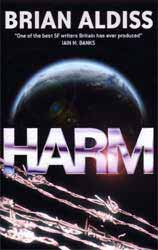|
Click here to return to the main site. Book Review
Paul is a British Muslim writer who, following the publication of a satirical novel, finds himself incarcerated in an unknown location and tortured to discover the intention behind the book. As the torture continues Paul finds that his reality is being juxtaposed with that of a man living in the far flung future on the colony planet of Stygia. What does it mean? Is it a hallucination or do the two worlds have something else in common...? Finally released in paperback format, Harm is the new novel by Brian Aldiss, a prolific and well respected writer, who has written many thought provoking science fiction stories, which quite happily sit in that grey area between sci-fi and literature. Harm is an uncompromising and unhappy look at the modern world. Although the book alternates between Stygia and a society of our near future, the Stygian society's development is used to hold a mirror to Paul's contemporary world. This is not an easy book to read, with both worlds portrayed as dystopian. Initially we are thrown straight into the narrative when we join Paul, who is only known as prisoner B. Hooded and shackled he is beaten and tortured for no apparent reason, other the fact that he was born Muslim. He protests that he does not follow the faith of his father, and has always thought of himself as English. This revelation is not immediately provided to the reader and sets up the first of the main threads of the book. To his interrogators he is Fadhil Abbas Ali, who’s every movement, action and belief is constrained by his ethnic origins. He is beaten for marrying a white Irish girl, his British birth is ignored and he has no rights. This is scarily closer to reality than we would like to think; with the government trying to extend the amount of time that someone can be held without recourse to a judge. At the beginning of the book, he tries to justify his treatment, even to himself, hating the terrorist and justifying the loss of liberty as a necessary action in the face of an attack on his - British - culture. As this side of the story progresses, Paul finds it far more difficult to isolate his politics from his ethnic origins. As his predicament worsens he finds himself also existing as Fremant, a thoughtful guard to the ruler of Stygia, Astaroth. Here humanity, fleeing from the fall of the western world, has been deconstructed and flung across the void to start a new world. Unfortunately the process which reconstituted them was somewhat flawed. The colonists destroy all the indigenous population and then set upon each other. It's difficult to know if Aldiss’s view of the world is as bleak as he seems to be suggesting; that it is part of the human condition to break into groups for the purpose of conflict and even the genocide of the opposing forces only leads to more divisions - which form the basis of the never ending cycle of violence which forms the backbone of human history. Aldiss deliberately leaves the connection between Paul and Fremant vague. We discover early on that the young Paul had been treated harshly as a child, including being locked in dark cupboards for long periods of time - a trauma which led him, as an adult, to develop a split personality. This is a book where science fiction and literature collide. At times it is a difficult book to read as Aldiss holds up a magnifying glass to what is happening in, and to, our own society. But it is also a book that will make you think. In the end this is the aim of all great literature. 10 Charles Packer |
|---|

